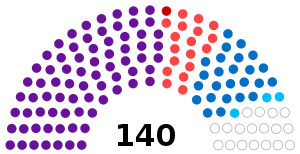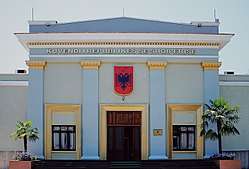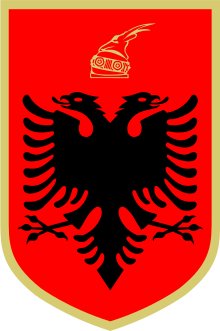Parliament of Albania
The Parliament of Albania (Albanian: Kuvendi i Shqipërisë) or Kuvendi is the unicameral representative body of the citizens of the Republic of Albania; it is Albania's legislature. The Parliament is composed of not less than 140 members elected to a four-year term on the basis of direct, universal, periodic and equal suffrage by secret ballot.[3][4][5] The Parliament is presided over by a Speaker of the Parliament, who is assisted by at least one deputy speaker. The electoral system is based on party-list proportional representation. There are 12 multi-seat constituencies, corresponding to the country's administrative divisions.
Parliament of Albania Kuvendi i Shqipërisë | |
|---|---|
| IX Legislature | |
 | |
| Type | |
| Type | |
| Leadership | |
Parliamentary leaders | |
| Structure | |
| Seats | 140 |
 | |
Political groups | Government (75)
Supported by (4) Opposition (43) Vacancies (18)
|
| Elections | |
| Closed party-list proportional representation D'hondt method | |
Last election | 25 June 2017 |
Next election | 2021 |
| Meeting place | |
 | |
| Website | |
| Official Website | |
The Parliament's powers are defined by the Constitution of Albania. It is responsible to amend the borders of Albania or the Constitution, passes all laws, approves the cabinet, supervises the work of the government, declares war, decides on cessation of hostilities, adopt the state's budgets and approve the state's accounts. Another duties includes, calling referenda, performs elections and appointments conforming to the constitution and applicable legislation, supervises operations of the government and other civil services responsible to the parliament, grants amnesty for criminal offences and performs other duties defined by the constitution. The Parliament also elects the President of the Republic. When the Parliament is elected, the first session shall be held no later than 20 days after the completion of elections with the President as the speaker.[6] However, all laws passed by the Parliament are published by the Albanian Official Journal (Albanian: Fletorja Zyrtare), which is the official journal of the Government of Albania.[7]
The oldest Parliament with extant records was held in Lezhë on 2 March 1444. The League of Lezhë (Kuvëndi i Lezhës) forged in Lezhë under Gjergj Kastrioti Skënderbeu as the leader against the Ottoman Empire.[8]
History of the Parliament
Modern
The legislative system in Albania has evolved under many different regimes, most notably in the period before 1947. From 1920 to 1923, Albania's legislature was known as the National Council (Albanian: Këshillit Kombëtar).[9] During the period of the Albanian Republic, the country had a bicameral legislature, consisting of a Senate (Albanian: Senati) and a Chamber of Deputies (Albanian: Dhoma e Deputetëve).[9] From 1928 to 1939, during the era of the Albanian Monarchy, Albania's legislature was known simply as the Parliament (Albanian: Parlamenti).[9]
During the Italian occupation of Albania and the existence of the 1939-43 Albanian Kingdom, Albania's legislature was known as the Supreme Fascist Cooperative (Albanian: Korporativi i Epërm Fashist).[9] From 1943 to 1944, during Nazi occupation of Albania and the formation of the 1943-44 Albanian Kingdom, Albania's legislature was known as the National Assembly (Albanian: Kuvendi Kombëtar).[9] From 1944 to late 1945, a National Anti-fascist Liberation Council (Albanian: Këshilli Antifashist Nacional Çlirimtar) was formed by politicians opposing the Nazi puppet government.[10]
Later during multiple periods of regime changes, Albania's legislature was known as the Constituent Assembly (Albanian: Asambleja Kushtetuese or Kuvendi Kushtetues). This occurred in 1924, prior to the formation of the Albanian Republic, in 1928, prior to the formation of the first iteration of the Albanian Kingdom, and from 1946 to 1947, prior during the era Democratic Government of Albania and prior to the formation of the People's Socialist Republic of Albania.[9]
Recent
From 1947 to 1999, during the era of the People's Socialist Republic of Albania, Albania's legislature was known as the People's Assembly (Albanian: Kuvendi Popullor).[9] Since 1997, the parliament has been known simply as the Parliament of the Republic of Albania (Albanian: Kuvendi i Republikës së Shqipërisë).[9][lower-alpha 1] Currently the President is elected by the parliament. The current members were chosen in the 2017 Albanian parliamentary election.
Powers, duties and responsibilities
The Parliament's powers are defined by the Constitution of Albania. The Parliament represents the citizens of the Republic of Albania, it acts as the country's legislature. It convenes regularly in two sessions each year, the first session on the third Monday of January and the second session on the first Monday of September.[14] However, extraordinary sessions may be called by the President of Albania, the Prime Minister of Albania or by one-fifth of the parliamentary members.[15] Further the sessions are open to the public.[16] The parliament decides through a majority votes, in the presence of more than half of its members, except for cases where the constitution provides for a qualified majority. However, decisions are made by three-fifths majority votes.[17]
Other powers of the parliament include defining economic, legal and political relations in Albania; preservation of Albania's natural and cultural heritage and its utilisation; and forming alliances with other nations. The parliament elect the President by secret ballot and without debate by three-fifths of the parliamentary members. The president addresses messages to the Parliament and sets the date of parliamentary elections, for the organs of local power and for the conduct of referenda. The president appoints the Prime Minister on the proposal of the parliament; if the Prime Minister is not approved, the parliament elects another Prime Minister within 10 days. As specified by the Constitution, no foreign military force may be situated in, or pass through, the borders of Albania, except by a law approved by the parliament. Due to that, it has the right to deploy Albanian Armed Forces outside its borders.[18]
Election
The 140 members of the Parliament serve four-year terms, with elections held every four years, or earlier in the relatively rare case that the Parliament is dissolved prematurely by the President.[19] 100 members are elected directly.[3] Elections for the Parliament are held 60 to 30 days before the end of the mandate and not later than 45 days after its dissolution. The seats of the Parliament are elected in a 12 constituency by closed list proportional representation. Seats are allocated using the d'Hondt method with a 2.5% electoral threshold. The Parliament can be dissolved by the President on the recommendation of the Prime Minister if the latter has lost a vote of confidence in the Parliament, if the recommendation is made and accepted before the Parliament acts to elect a new Prime Minister.[20]
Composition of the Parliament
The Constitution of Albania mandates that the Parliament consists of not less than 140 members, elected by a direct elected secret ballot for four-year terms. The electoral system is closed list proportional representation. There are 12 multi-member constituencies corresponding to the 12 administrative regions of the country. Parliamentary elections are held within 60 days to 30 days before the end of the mandate and not later than 45 days after dissolution.
As specified by the current electoral legislation in Albania, 140 members of the Parliament are elected in multi-seat constituencies. Within any constituency, parties must meet a threshold of 3 percent of votes, and pre-election coalitions must meet a threshold of 5 percent of votes.[21][22]
31st Parliament
The two largest political parties in Albania are the Socialist Party (PS) and the Democratic Party (PD). The last elections were held on 25 June 2017. Following is a list of political parties with representation in the Parliament by the 2017 Albanian parliamentary election:
| Logo | Name | Abbr. | Founded | Leader | Ideology | MPs |
|---|---|---|---|---|---|---|
| Socialist Party of Albania Partia Socialiste e Shqipërisë |
PS | 15 August 1991 | Edi Rama | Social democracy, Third Way, Progressive, Centre-left, Western, Modernism, Social liberalism | 74 / 140 | |
| Democratic Party of Albania Partia Demokratike e Shqipërisë |
PD | 19 December 1990 | Lulzim Basha | Liberal conservatism, Conservatism, Nationalism, Pro-Europeanism, Centre-right, Economic liberalism | 43 / 140 | |
| Socialist Movement for Integration Lëvizja Socialiste për Intigrim |
LSI | 23 September 2004 | Monika Kryemadhi | Social democracy, Progressivism, Centre-left | 19 / 140 | |
| Party for Justice, Integration and Unity Partia për Drejtësi, Integrim dhe Unitet |
PDIU | 1 March 2011 | Shpëtim Idrizi | Nationalism, Right-wing, Ethnic nationalism, Cham issue | 3 / 140 | |
| Social Democratic Party of Albania Partia Socialdemokrate e Shqipërisë |
PSD | 23 April 1991 | Ëngjëll Bejtaj | Social democracy, Centre-left | 1 / 140 |
Post February 2019 Parliamentary Composition
During the political crisis, opposition parties announced that all their MP's in the Parliament would resign from the parliament on February 22nd, more than 40 seats were vacated and the Central Elections Commission started in the following days the procedures to replace the MP's with mostly unknown and inexperienced figures that were part of the candidate lists during the 2017 election.
After weeks of filling the vacancies, in the end the parliament had this composition.
| Logo | Name | Abbr. | Founded | Leader | Ideology | MPs |
|---|---|---|---|---|---|---|
| Socialist Party of Albania Partia Socialiste e Shqipërisë |
PS | 15 August 1991 | Edi Rama | Social democracy, Third Way, Progressive, Centre-left, Western, Modernism, Social liberalism | 74 / 140 | |
| Party for Justice, Integration and Unity Partia për Drejtësi, Integrim dhe Unitet |
PDIU | 1 March 2011 | Shpëtim Idrizi | Nationalism, Right-wing, Ethnic nationalism, Cham issue | 3 / 140 | |
| Social Democratic Party of Albania Partia Socialdemokrate e Shqipërisë |
PSD | 23 April 1991 | Ëngjëll Bejtaj | Social democracy, Centre-left | 1 / 140 | |
| Democratic Group Grupi Demokrat |
8 / 140 | |||||
| Right-wing group Grupi partitë e djathta |
7 / 140 | |||||
| Independent Të Pavarur |
9 / 140 | |||||
| Vacant Seats |
18 / 140 | |||||
Committees of the Parliament
Parliamentary committees investigate specific matters of policy or government administration or performance that cannot be directly handled by the Parliament due to their volume. The committees provide an opportunity for organisations and individuals to participate in policy making and to have their views placed on the public record and considered as part of the decision-making process.
The Parliament has the following committees:[23]
- Committee on Legal Affairs, Public Administration and Human Rights
- Committee on European Integration
- Committee on Foreign Policy
- Committee on Economy and Finance
- Committee on National Security
- Committee on Production Activities, Trade and Environment
- Committee on Labour, Social Affairs and Health
- Committee on Education and Public Information Media
Legislatures (1920–present)
| No. | Legislature | MPs | Parties | ||
| 1 | National Council | 27 March 1920 | 20 December 1920 | 42 | 0 |
| 2 | National Council | 21 April 1921 | 30 September 1923 | 65 | 2 |
| 3 | Constitutional Assembly | 21 January 1924 | 2 June 1924 | 95 | 2 |
| 4 | Deputies Chamber – Senate | 1 June 1925 | 7 June 1928 | 46/16 | 0 |
| 5 | Constituent Assembly/Parliament | 25 August 1928 | 11 May 1932 | 49 | 0 |
| 6 | Parliament | 21 November 1932 | 16 November 1936 | 54 | 0 |
| 7 | Parliament | 10 February 1937 | 7 April 1939 | 57 | 0 |
| 8 | Constitutional Assembly | 12 April 1939 | 3 April 1940 | 162 | 1 |
| 9 | Superior Fascist Corporative Council | 3 April 1940 | 31 July 1943 | 69 | 1 |
| 10 | National Assembly/Parliament | 16 October 1943 | 14 September 1944 | 193 | 0 |
| 11 | Anti-Fascist National Liberation Council | 24 May 1944 | 22 December 1945 | 119 | 1 |
| 12 | Constitutional Assembly/People's Assembly | 10 January 1946 | 21 January 1950 | 101 | 1 |
| 13 | People's Assembly | 30 June 1950 | 14 April 1954 | 116 | 1 |
| 14 | People's Assembly | 20 July 1954 | 21 February 1958 | 129 | 1 |
| 15 | People's Assembly | 21 June 1958 | 3 June 1962 | 180 | 1 |
| 16 | People's Assembly | 14 July 1962 | 12 March 1966 | 210 | 1 |
| 17 | People's Assembly | 10 September 1966 | 4 May 1970 | 234 | 1 |
| 18 | People's Assembly | 20 November 1970 | 19 June 1974 | 261 | 1 |
| 19 | People's Assembly | 28 October 1974 | 21 February 1978 | 238 | 1 |
| 20 | People's Assembly | 25 December 1978 | 14 July 1982 | 250 | 1 |
| 21 | People's Assembly | 22 November 1982 | 10 January 1987 | 250 | 1 |
| 22 | People's Assembly | 19 February 1987 | 13 November 1990 | 250 | 1 |
| 23 | Constitutional Assembly | 15 April 1991 | 4 February 1992 | 250 | 3 |
| 24 | People's Assembly | 4 April 1992 | 29 March 1996 | 130 | 5 |
| 25 | People's Assembly | 1 July 1996 | 15 May 1997 | 140 | 5 |
| 26 | Assembly | 23 July 1997 | 17 May 2001 | 150 | 13 |
| 27 | Assembly | 3 September 2001 | 20 May 2005 | 135 | 12 |
| 28 | Assembly | 2 September 2005 | 14 May 2009 | 140 | 12 |
| 29 | Assembly | 14 September 2009 | 5 September 2013 | 140 | 6 |
| 30 | Assembly | 5 September 2013 | 4 September 2017 | 140 | 6 |
| 31 | Assembly | 9 September 2017 | Incumbent | 140 | 5 |
Notes
References
- http://top-channel.tv/2019/04/18/opozita-e-re-krijon-grupet-aksioni-i-pare-ne-kuvend-interpelanca-per-rinasin/
- "Albania's democracy hangs by a thread as opposition quits parliament, launches mass protests · Global Voices". Global Voices. 25 February 2019. Retrieved 22 October 2019.
- "1998 Constitution of the Republic of Albania" (PDF). osce.org. p. 12.
Article 64 - 1. The Assembly consists of 140 deputies. One hundred deputies are elected directly in single member electoral zones with an approximately equal number of voters. Forty deputies are elected from multi-name lists of parties or party coalitions according to their ranking
- "1998 Constitution of the Republic of Albania" (PDF). osce.org. p. 1.
Article 1 - 3.: Governance is based on a system of elections that are free, equal, general and periodic.
- "1998 Constitution of the Republic of Albania" (PDF). osce.org. p. 1.
Article 2 - 1 & 2.: Sovereignty in the Republic of Albania belongs to the people.; The people exercise sovereignty through their representatives or directly.
- "1998 Constitution of the Republic of Albania" (PDF). osce.org. p. Article 67.
- "CRL Foreign Official Gazette Database – Albania". apps.crl.edu.
- "Kuvendi i Lezhës (1444)". letersia.fajtori.com (in Albanian).
- "Leaders over the years". parlament.al. Albanian Parliament. Retrieved 7 June 2016.
- "Kronologji e legjislaturave në Shqipëri (Chronology of legislatures in Albania)" (in Albanian). Albanian Parliament. Retrieved 7 June 2016.
- Hysa, Ramazan (2003). Albanian-English, English-Albanian Standard Dictionary. New York, NY: Hippocrene Books. p. 184. ISBN 978-0-7818-0979-5.
- Leonard, Newmark, ed. (1999). Albanian-English Dictionary. New York, NY: Oxford University Press. pp. 431–432. ISBN 0-19-860322-3.
- "Republic of Albania Parliament". Albanian Parliament. Retrieved 7 June 2016.
- "1998 Constitution of the Republic of Albania". osce.org. p. 14.
The Assembly conducts its annual work in two sessions. The first session begins on the third Monday of January and the second session on the first Monday of September
- "1998 Constitution of the Republic of Albania". osce.org.
The Assembly meets in extraordinary session when requested by the President of the Republic, the Prime Minister or by one-fifth of all the deputies
- "1998 Constitution of the Republic of Albania". osce.org. p. 15.
Meetings of the Assembly are open.
- "1998 Constitution of the Republic of Albania". osce.org. p. 15.
There are approved by three-fifths of all members of the Assembly
- "1998 Constitution of the Republic of Albania". osce.org. p. 3.
No foreign military force may be situated in, or pass through, the Albanian territory, and no Albanian military force may be sent abroad, except by a law approved by a majority of all members of the Assembly.
- "1998 Constitution of the Republic of Albania". osce.org. p. 12.
The Assembly is elected for four years.
- "1998 Constitution of the Republic of Albania". osce.org. p. 19.
If the Assembly fails to elect a new Prime Minister, the President of the Republic dissolves the Assembly.
- "IFES Election Guide - Country Profile: Albania". www.electionguide.org. Retrieved 25 June 2017.
- "Part XII Allocation of Seats". The Electoral Code of the Republic of Albania (English translation by OSCE) (pdf). p. 140. Retrieved 22 September 2014.
- "Komisionet". parlament.al (in Albanian).
